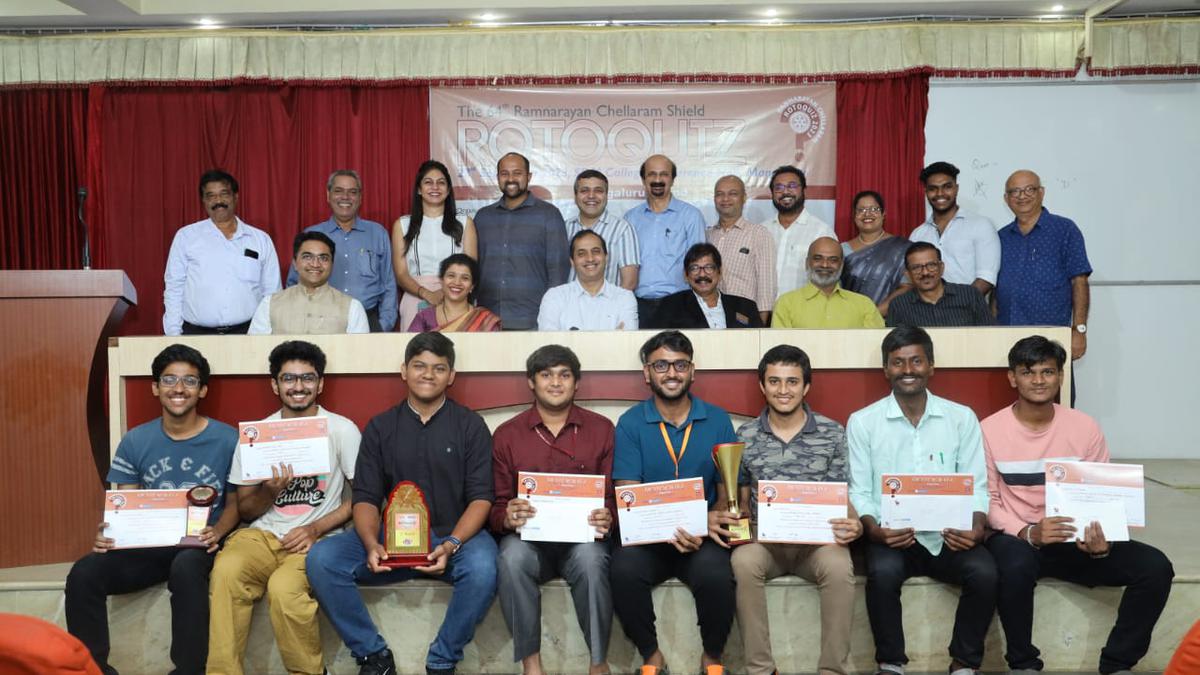
Nischal and Shreevatsa Acharya win Mangaluru round of Ramnarayan Chellaram Rotoquiz
The Hindu
R. Nischal and B. Shreevatsa Acharya, MBBS interns from Kasturba Medical College, Mangaluru, emerged winners in the Mangaluru round of the Ramnarayan Chellaram Rotoquiz on Saturday. They won the prize for the second year running
R. Nischal and B. Shreevatsa Acharya, MBBS interns from Kasturba Medical College, Mangaluru, emerged winners in the Mangaluru round of the Ramnarayan Chellaram Rotoquiz on Saturday. They won the prize for the second year running.
B. Manjunath Pai and Sanketh Alva from St. Aloysius College won the second prize, Shashank Raju Singit and Karthik Karanth from NITK-Surathkal won the third, and Shankaragouda and Arun M. Myageri from NITK-Surathkal won the fourth prizes.
The Mangaluru round of the 64th edition of Ramnarayan Chellaram Rotoquiz, the oldest running quiz in the world, was organised by the Rotary Club of Mangalore and Rotaract Club of SDM PG Centre at the PG Centre for Management and Research here. As many as 63 teams represented by 126 students participated in the quiz.
All the winners were presented a trophy and certificates along with cash prizes. The Mangaluru round winners competed in the finals being organised by Rotary Club of Bangalore at Bengaluru on Monday.

“Writing, in general, is a very solitary process,” says Yauvanika Chopra, Associate Director at The New India Foundation (NIF), which, earlier this year, announced the 12th edition of its NIF Book Fellowships for research and scholarship about Indian history after Independence. While authors, in general, are built for it, it can still get very lonely, says Chopra, pointing out that the fellowship’s community support is as valuable as the monetary benefits it offers. “There is a solid community of NIF fellows, trustees, language experts, jury members, all of whom are incredibly competent,” she says. “They really help make authors feel supported from manuscript to publication, so you never feel like you’re struggling through isolation.”

Several principals of government and private schools in Delhi on Tuesday said the Directorate of Education (DoE) circular from a day earlier, directing schools to conduct classes in ‘hybrid’ mode, had caused confusion regarding day-to-day operations as they did not know how many students would return to school from Wednesday and how would teachers instruct in two modes — online and in person — at once. The DoE circular on Monday had also stated that the option to “exercise online mode of education, wherever available, shall vest with the students and their guardians”. Several schoolteachers also expressed confusion regarding the DoE order. A government schoolteacher said he was unsure of how to cope with the resumption of physical classes, given that the order directing government offices to ensure that 50% of the employees work from home is still in place. On Monday, the Commission for Air Quality Management in the National Capital Region and Adjoining Areas (CAQM) had, on the orders of the Supreme Court, directed schools in Delhi-NCR to shift classes to the hybrid mode, following which the DoE had issued the circular. The court had urged the Centre’s pollution watchdog to consider restarting physical classes due to many students missing out on the mid-day meals and lacking the necessary means to attend classes online. The CAQM had, on November 20, asked schools in Delhi-NCR to shift to the online mode of teaching.









